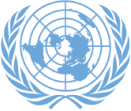Statement by His Excellency Mr. Rudolph Michael Ten-Pow, Ambassador, Permanent Representative of the Cooperative Republic of Guyana on behalf of the Caribbean Community (CARICOM) at Intergovernmental Negotiations on the Question of Equitable Representation on and Increase in the Membership of the Security Council and Other Matters Related to the Council
Thank you Co-Chairs.
Let me say that CARICOM finds these interactive sessions useful for further clarifying
the proposals that the various delegations have put forward. We regret that we are not
yet in full negotiating mode, as then we would have derived maximum value from these
sessions. Nonetheless, we support the format.
CARICOM will address two points in this interactive session.
First, regarding paragraph 6.j., which contains the different proposals put forward for the
distribution of seats among the regions in an expanded Council, the Member States of
CARICOM are satisfied with this paragraph and to further enhance it, each Member State
or group of Member States should clarify whether their proposal on the regional
distribution of additional seats of the Council is accurately reflected. Here I beg to
amicably differ with my friend Carmelo, but I see no contradiction between having a text
and getting to the bottom of each proposal. On the contrary, working with a text makes
it easier to get to the bottom of every proposal that has been put on the table.
It also follows that in order to avoid any ambiguity, it would be useful to identify the
proponents of each proposal. CARICOM for its part does not have a difficulty being
clearly identified in the document as the proponent of the proposal for a non-permanent
SIDS seat across all regions.
The second point concerns the proposed SIDS seat. We have taken note of the requests
from several delegations for more information on this proposal. Ambassador King of
L.69 alluded to some of the justification behind this proposal. At this stage and in a
preliminary way, CARICOM would like to place a few elements on the table for
consideration.
Firstly, SIDS make up a significant percentage of the UN membership – nearly 20%. This
represents a phenomenal growth in SIDS membership between the time the UN was
created in 1946 and today 2018. In 1946, 3 of the original 51 UN member states [or 6%]
were SIDS – Cuba, the Dominican Republic and Haiti. In the intervening 72 years, UN
membership has increased nearly 4 times over from 51 to 193. In comparison, SIDS
membership has expanded over twelvefold - from 3 to 37. This increase in SIDS
membership has not been reflected in their participation in the Security Council.
Secondly, despite the significant percentage of SIDS that make up the UN membership,
only 7 of us have ever served as non-permanent members of the Council: Cabo Verde,
Guinea-Bissau, my own country Guyana, Jamaica, Singapore and Trinidad and Tobago.
In fact, of the 66 Member States that have never served on the Council, nearly half are
SIDS.
Over the years, the Security Council has specifically dealt with a number of SIDS by way
of Missions, Resolutions, Presidential Statements and Press Statements. In the majority
of cases, those deliberations did not benefit from the involvement of any SIDS to add our
perspective. As CARICOM has noted on multiple occasions, SIDS have distinct and
practical perspectives on matters of peace and security, among others that have been
informed by their size, their remoteness, their developmental status, and by their history
and vulnerabilities. They are therefore in a position to make a unique and valuable
contribution to the maintenance of international peace and security, particularly given
the new threats to peace and security emerging in today’s world, including the impact of
climate change on vulnerable societies. I should add that those SIDS who have served
on the Council have demonstrated that this bloc of countries has the ability to be
constructive participants in the work of the Council.
Lastly, it is true that the Security Council has tackled a number of pressing issues of
special importance to SIDS – issues such as small arms and HIV/AIDS - but it has not
benefitted from effective SIDS participation. Further, other issues of existential
significance to SIDS, such as climate change, have not been substantively considered by
the Council.
These are just a few of the reasons why CARICOM will continue to advocate that a
guaranteed presence of SIDS on the Council is both justified and desirable and we are
encouraged by the voices that have been raised in support, even at this preliminary stage,
of the concept of a rotating seat for SIDS.
Some have enquired about how the cross-regional arrangement will work but we do not
think that it is appropriate to get into those specifics at this time given that negotiations
have not yet begun in earnest. Rest assured, however, that we are ready to engage further
on our proposal once the negotiations begin.
I thank you.


